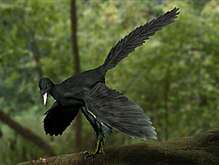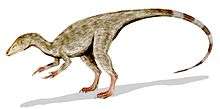Camadas de Guimarota
The Camadas de Guimarota, simply Guimarota, or Camadas de Alcobaça is a disused coal mine near the city of Leiria in central Portugal. The mine is within layers of the Alcobaça Formation, Kimmeridgian age of the Late Jurassic period,[1] it contains a diverse array of fossil animals and plants, including dinosaurs and mammals.
The locality was extensively worked by paleontologists from the Free University of Berlin, but this activity stopped in 1982. Further excavations are considered to be unlikely, since the mine is now flooded. Pumping it out and rendering it safe again would be prohibitively expensive.
The mammal remains from this site are of particular note. The excavations were so successful that many of the recovered remains have yet to be studied.
Vertebrate fauna
Indeterminate allosauroid, ceratosaur, dromaeosaurid, iguanodont, and tyrannosaurid remains are known from Camadas de Guimarota strata in Distrito de Leiria, Portugal.[1] Dinosaur eggs are also known from Camadas de Guimarota strata in Distrito de Leiria, Portugal.[1]
Color key
|
Notes Uncertain or tentative taxa are in small text; |
| Dinosaurs of the Camadas de Guimarota Formation | |||||||
|---|---|---|---|---|---|---|---|
| Genus | Species | Location | Stratigraphic position | Abundance | Notes | Images | |
|
Indeterminate[1] |
Geographically located in Distrito de Leiria, Portugal.[1] |
| |||||
|
A. jurassica[1] |
Geographically located in Distrito de Leiria, Portugal.[1] |
||||||
|
Indeterminate[1] |
Geographically located in Distrito de Leiria, Portugal.[1] |
Guimarota remains once tentatively attributed to Bothriospondylus are now regarded as indeterminate sauropod remains.[1] | |||||
|
Indeterminate[1] |
Geographically located in Distrito de Leiria, Portugal.[1] |
||||||
|
Indeterminate[1] |
Geographically located in Distrito de Leiria, Portugal.[1] |
Fossils once attributed to cf. Paronychodon sp. are now regarded as possible indeterminate troodontid remains. | |||||
|
P. henkeli[1] |
Geographically located in Distrito de Leiria, Portugal.[1] |
Fossils once tentatively attributed to Phyllodon henkeli are now regarded as indeterminate euornithopod remains.[1] | |||||
|
Indeterminate[1] |
Geographically located in Distrito de Leiria, Portugal.[1] |
||||||
|
Indeterminate[1] |
Geographically located in Distrito de Leiria, Portugal.[1] |
||||||
See also
- List of dinosaur-bearing rock formations
References
- Weishampel, David B; et al. (2004). "Dinosaur distribution (Late Jurassic, Europe)." In: Weishampel, David B.; Dodson, Peter; and Osmólska, Halszka (eds.): The Dinosauria, 2nd, Berkeley: University of California Press. Pp. 545–549. ISBN 0-520-24209-2.
- Listed as "?Bothriospondylus sp." in Weishampel, David B; et al. (2004). "Dinosaur distribution (Late Jurassic, Europe)." In: Weishampel, David B.; Dodson, Peter; and Osmólska, Halszka (eds.): The Dinosauria, 2nd, Berkeley: University of California Press. Pp. 545–549. ISBN 0-520-24209-2.
- Listed as "cf. Paronychodon sp." in Weishampel, David B; et al. (2004). "Dinosaur distribution (Late Jurassic, Europe)." In: Weishampel, David B.; Dodson, Peter; and Osmólska, Halszka (eds.): The Dinosauria, 2nd, Berkeley: University of California Press. Pp. 545–549. ISBN 0-520-24209-2.
- Listed as "?Phyllodon henkeli" in Weishampel, David B; et al. (2004). "Dinosaur distribution (Late Jurassic, Europe)." In: Weishampel, David B.; Dodson, Peter; and Osmólska, Halszka (eds.): The Dinosauria, 2nd, Berkeley: University of California Press. Pp. 545–549. ISBN 0-520-24209-2.
- Listed as "cf. Richardoestesia sp." in Weishampel, David B; et al. (2004). "Dinosaur distribution (Late Jurassic, Europe)." In: Weishampel, David B.; Dodson, Peter; and Osmólska, Halszka (eds.): The Dinosauria, 2nd, Berkeley: University of California Press. Pp. 545–549. ISBN 0-520-24209-2.



